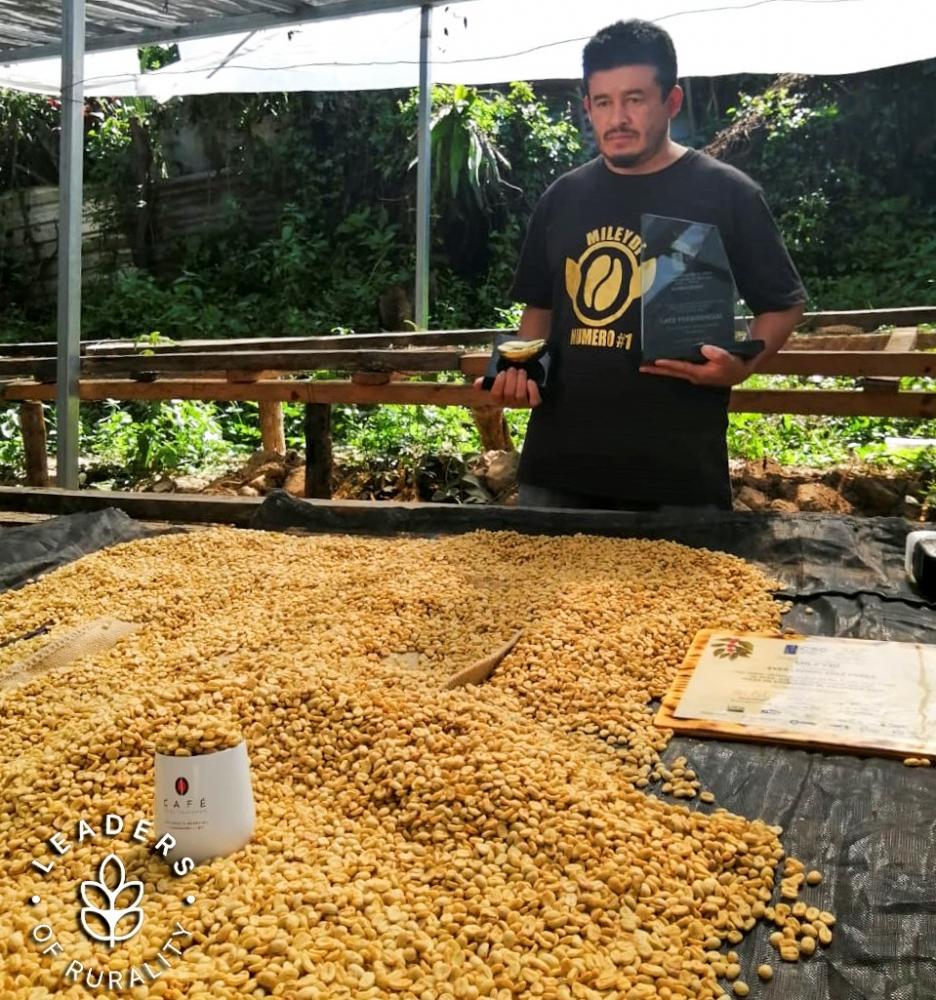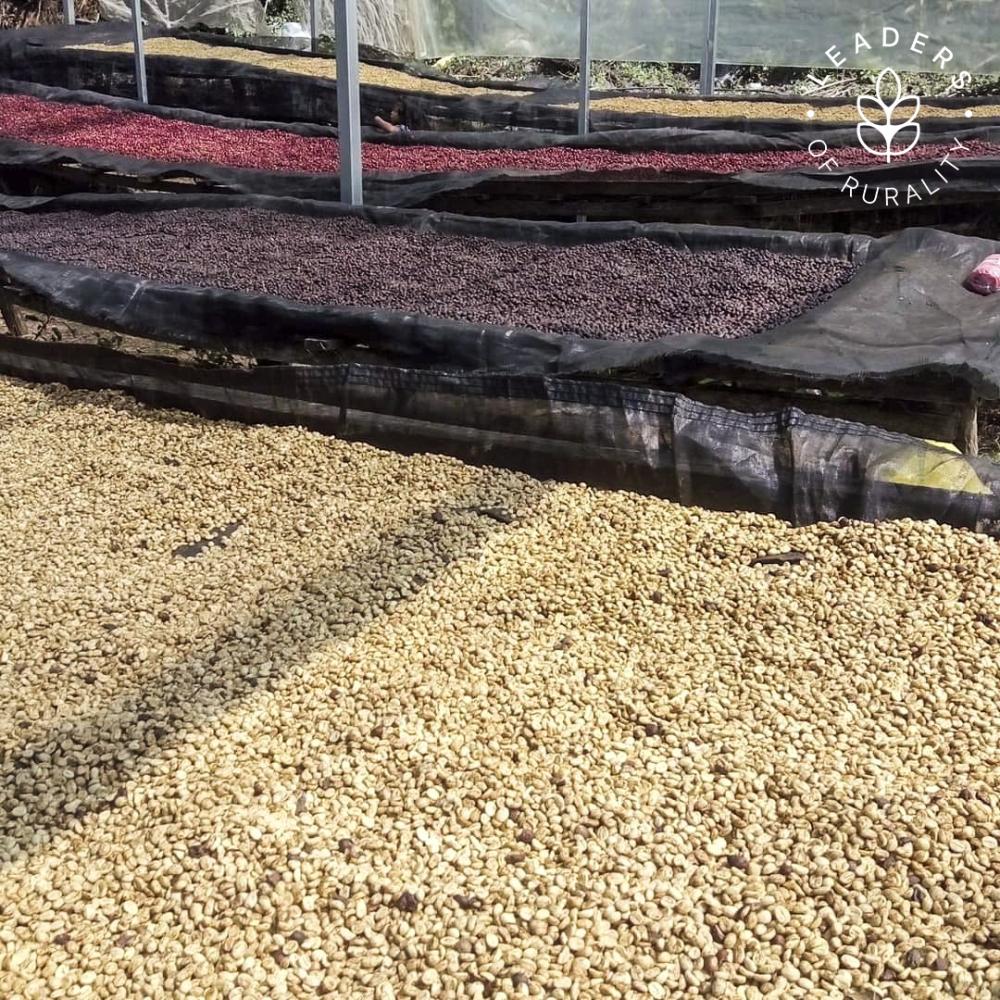Salvadoran coffee producer and “Cup of Excellence 2021” winner Ever Díaz to receive IICA’s “Leaders of Rurality” award

San Jose, 19 August 2021 (IICA). Ever Díaz, a coffee farmer from El Salvador, will receive the “Soul of Rurality” award, bestowed on Leaders of Rurality in the Americas by the Inter-American Institute for Cooperation on Agriculture (IICA).
The award is part of an initiative by the specialized agency in rural and agricultural development to recognize the men and women who are leaving their mark and making a difference in the rural areas of Latin America and the Caribbean.
Ever Díaz was born into a farming family in western El Salvador and took an interest in coffee as a teenager. His ten-hectare farm supports five other rural families and has become a benchmark of the country’s goal to recover its regional leadership as a coffee producing nation.
In addition to receiving the “Soul of Rurality” award, the Leaders of Rurality recognized by IICA will be invited to participate in several of the agency’s advisory bodies.
“This award pays tribute to those who are playing a unique dual role: guaranteeing food and nutritional security by producing under all circumstances, and protecting the biodiversity of the planet. It will also emphasize their capacity to be positive role models in the rural areas of the region”, stated Manuel Otero, Director General of IICA, in presenting the initiative.
Within the framework of the program, IICA strives to ensure the recognition creates ties with official, civil society and private sector organizations to gain support for their causes.
“These are people whose influence can be seen in the food that we eat—wherever it may end up—and in each plot of agricultural land and in the communities where farmers and their families live. These are men and women who are leaving their mark and are the soul of rurality because they produce, plant, harvest, create, innovate, and unite”, reflected IICA’s Director General.
“They embody silent leadership, which is something we should spotlight and recognize. Above all, they are role models, because they transform, overcome adversity, and inspire”, he added.
IICA is working alongside its 34 Delegations in the Americas to select the #LeadersofRurality.
Ever Díaz: A story of hard work and survival to produce one of the best coffees in the world in El Salvador
Ever Díaz was born into a farming family in the department of Chalatenango in El Salvador’s central zone bordering on Honduras. He was 16 years old when he took an interest in coffee and asked his father for a small parcel of land on their farm to plant Pacamara, an exotic bean variety created in El Salvador in the 1950s but that was on the decline in recent years.
“Pacamara was just starting to make a comeback when I chose it because I was curious and liked the larger beans. My father said it wasn’t worth planting, but I didn’t listen; I moved forward with my plan and the Pacamara acclimatized to the farm”, tells Díaz.
The Pacamara did so well that today, 38-year-old Ever Díaz is a successful coffee farmer whose product grown on Mileydi Farm in Chalatenango is enjoyed in countries as far and wide as the United States, Russia, Australia, Japan, and Singapore, where consumers value its quality.
In June, Díaz received the highest recognition when he was awarded the Cup of Excellence El Salvador 2021, through which the Ministry of Agriculture and Livestock distinguishes the highest quality coffees in the country. The competition has a demanding selection process in which the coffee is tasted by both national and international judges.
Mileydi Farm spans approximately ten hectares and is located in the municipality of La Palma. There Ever, his wife Norelvia Elías, and their three children of 11, 9 and 2 have cows and several coffee varieties from Panama and Colombia, as well as the prized Pacamara.
The farm is ideal for growing coffee as it is located at an altitude of 1,350 meters above sea level and boasts a colder, damper climate than the majority of the rest of El Salvador.
Recently, the family bought a second six-hectare farm, La Bonita, located 1,800 m.a.s.l. The coffee Norelvia presented this year to the Cup of Excellence was from this farm and took home 11th place.
With small-scale farmers like Ever and Norelvia, El Salvador aims to recover its coffee production, which 50 years ago was one of the most important and highest quality in Latin America.
Ever explains that due to a drop in prices, “at one point, all of the large coffee farmers abandoned production at their farms. Today, prices aren’t a problem and I do well. At the last international coffee auction in August, I sold to the United States and Japan. Before that I sent a small lot to Australia and another to Russia. Thank God my coffee is very exportable, even though I’m a small farmer”.

The international auction was a virtual event organized by the Salvadoran Coffee Council (CSC, in Spanish) and the Alliance for Coffee Excellence (ACE), at which the country’s 24 best coffees, all awarded the Cup of Excellence in July, were sold to the rest of the world.
Ever’s work day starts early—at 6 a.m. when he plans to work at Mileydi Farm and 4 a.m. when he goes to La Bonita. Until last year, he did all his work and travel on horseback, but after his hard work last year, he was able to buy a 4x4 vehicle to make things easier. According to him, his growth has allowed five other families to live off of his coffee crops.
Constant, personal care is perhaps the biggest secret to the success of Mileydi Farm. “The biggest threat to coffee is rust. You can have a great plantation, but if rust takes over, you’ll have to throw it out”, explains Ever.
The department of Chalatenango produces 10% of all coffee in El Salvador thanks to its microclimate. “The temperatures are somewhat cold and the soil is always damp. Coffee likes these conditions. It’s too hot in other parts of the country”, explains Ever.
Díaz describes himself as passionate about coffee. “Coffee has been my life for over 20 years. My farm today is the result of hard work and patience, because a coffee farmer’s work doesn’t come to light overnight. It’s a process. I have a great love for coffee and I am constantly touring the farm. Not even at the pandemic’s worst did I stop working, despite the isolation measures. Now I want to keep innovating”.
Ever Díaz has lived his entire life in the countryside and would not trade his rural life, which he values most for its tranquility and safety.
“Here, after 8 p.m., you don’t hear a sound. And there are always resources—we know that no one will ever be without food. I’m convinced that with agriculture we will recover El Salvador”.
More information:
Institutional Communication Division.
comunicacion.institucional@iica.int
Photo gallery